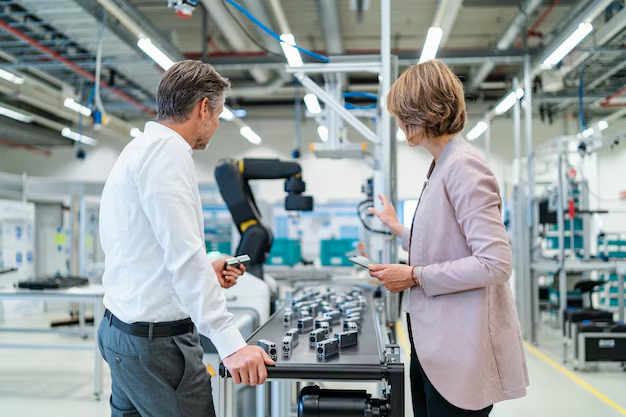The world of robotics is undergoing a revolution. With advancements in automation and artificial intelligence (AI), robots are becoming more intelligent, capable, and integrated into every facet of modern life. From manufacturing to healthcare, logistics, and even our homes, robotics innovations are transforming industries, driving economic growth, and Robotics Revolution reshaping the way we live and work. In this article, we explore the latest innovations in automation and AI within robotics and how these technologies are revolutionizing our world.
1. Robotics and AI: The Perfect Partnership
The Integration of Artificial Intelligence with Robotics: AI and robotics are increasingly working hand-in-hand, creating intelligent machines that can learn, adapt, and make decisions. This synergy is helping robots perform tasks that were once thought to be exclusive to humans. For example, AI allows robots to analyze data, recognize patterns, and even predict outcomes, making them more effective in industries like manufacturing, healthcare, and logistics.
Benefits of Combining AI with Robotics:
- Self-Learning Capabilities: Robots equipped with AI can improve their performance over time by learning from their environment.
- Enhanced Decision Making: AI-powered robots can make decisions faster and more accurately than humans, reducing errors and increasing productivity.
- Adaptability: AI allows robots to adjust to dynamic situations, making them highly adaptable in various industries.
2. Automation in Manufacturing: Redefining Production

How Robotics is Transforming Manufacturing: Robotics and automation have already made a significant impact in manufacturing, and this trend is set to accelerate. Robots are taking over repetitive and dangerous tasks, such as assembly, welding, and painting, leading to higher productivity and lower costs for manufacturers.
Key Innovations in Manufacturing Robotics:
- Collaborative Robots (Cobots): Unlike traditional industrial robots that work in isolation, cobots are designed to work alongside humans, improving safety and productivity.
- Robotic Process Automation (RPA): In non-manufacturing tasks, RPA is automating business processes, reducing the need for manual labor and boosting efficiency.
- 3D Printing and Robotics: The integration of 3D printing with robotics allows manufacturers to create custom parts on demand, reducing material waste and inventory costs.
The Future of Robotics in Manufacturing: As AI continues to evolve, the robots of tomorrow will be capable of more complex tasks, such as problem-solving and real-time decision-making. This will allow manufacturers to create highly personalized products while maintaining efficiency and reducing waste.
3. AI-Powered Robots in Healthcare: Revolutionizing Patient Care
Transforming Healthcare with Robotics and AI: AI and robotics are improving patient care in many ways, from robotic-assisted surgeries to AI-powered diagnostic tools. In the coming years, robots will become even more advanced, providing more precise and personalized care.
Innovations in Healthcare Robotics:
- Robotic Surgery: Robotic-assisted surgeries allow surgeons to perform minimally invasive procedures with greater precision, resulting in quicker recovery times and fewer complications.
- AI in Diagnostics: AI algorithms are being used to analyze medical images, identify diseases earlier, and suggest treatment plans, improving patient outcomes.
- Robotic Rehabilitation: Robots are also being used for physical rehabilitation, offering consistent and personalized therapy to patients recovering from injuries or surgeries.
The Future of Robotics in Healthcare: As AI continues to progress, we can expect robots to become more intuitive in understanding patient needs, enhancing healthcare delivery, and even providing remote care for patients in underserved areas.
4. Robotics in Logistics: Streamlining Supply Chains
Robots in Warehouses and Supply Chains: Automation is transforming logistics by improving the speed and accuracy of supply chains. AI-powered robots are helping companies manage inventory, sort goods, and deliver products more efficiently.
Key Robotics Innovations in Logistics:
- Autonomous Mobile Robots (AMRs): These robots are designed to move goods around warehouses and factories autonomously, optimizing storage and reducing human labor.
- Drones for Delivery: In e-commerce, drones are increasingly being used for fast and efficient last-mile deliveries.
- AI-Powered Sorting Systems: AI-driven robots can sort products with high precision, improving order accuracy and reducing errors in the supply chain.
The Future of Robotics in Logistics: As automation technology continues to improve, robotics in logistics will further optimize supply chain processes, reducing costs, enhancing delivery times, and minimizing human error.
5. Robotics in Everyday Life: Enhancing Daily Activities
How Robotics is Changing Our Homes and Lives: Robots are gradually becoming a part of our daily lives. From home assistants to smart appliances, the integration of robotics is improving the way we live, making everyday tasks more efficient and convenient.
Innovations in Consumer Robotics:
- Robotic Vacuum Cleaners: Robotic vacuum cleaners have made household cleaning easier, and with AI, they now map rooms, avoid obstacles, and adjust cleaning schedules based on user preferences.
- Home Assistance Robots: Robots are being developed to assist with various tasks around the house, from cooking to elderly care, making it easier for individuals to live independently.
- Personalized Robots: In the future, robots will learn individual habits and preferences, offering highly personalized services for cooking, cleaning, and even entertainment.
The Future of Robotics in Daily Life: With advancements in AI, robots will become even more intelligent, offering smarter homes, personalized health monitoring, and enhanced daily experiences. Expect to see robots performing complex household chores and even assisting with remote work.
6. Ethical Considerations in Robotics and AI
The Growing Concerns of AI and Robotics: While the robotics revolution offers numerous benefits, it also raises ethical questions. From job displacement to privacy concerns and the potential misuse of AI, the rapid rise of automation and robotics must be carefully managed.
Key Ethical Challenges:
- Job Loss and Automation: As robots take over more tasks, concerns about job displacement and the need for retraining programs become more prominent.
- Privacy and Security: With robots integrated into homes and workplaces, ensuring data privacy and security is a critical issue.
- AI Bias: The algorithms that power AI robots can sometimes reflect biases, raising concerns about fairness in decision-making.
Addressing Ethical Issues in Robotics: It is crucial to create policies and frameworks that ensure robots and AI are used ethically. These should include fair labor practices, privacy protection, and unbiased algorithms to ensure that robotics benefits society as a whole.
Also Read : The Future Of Robotics: How Automation Is Shaping Our World
Conclusion: The Robotic Future Is Now
The robotics revolution is just beginning. Innovations in automation and AI are already transforming industries and enhancing everyday life, creating new opportunities and efficiencies. From manufacturing to healthcare, logistics, and even our homes, robots are improving productivity, safety, and convenience. As AI continues to evolve, we can expect even more groundbreaking advancements in robotics that will shape our world in ways we cannot yet fully imagine.
However, with these advancements come important ethical considerations that need to be addressed to ensure the responsible and fair use of these powerful technologies. The future of robotics holds immense promise, and it’s up to us to guide its development in a way that benefits all of society.
SEO Keywords to Include: robotics revolution, automation and AI, robotics innovations, AI-powered robots, manufacturing automation, collaborative robots, robotic surgery, robotics in healthcare, robotics in logistics, autonomous robots, robotics in daily life, job displacement and robotics, future of robotics, ethical implications of AI, consumer robotics, smart home robots, robotic vacuum cleaners, AI in manufacturing, robotics technology advancements, robotics in supply chain management, autonomous vehicles, robotics in business, robotics in healthcare, AI algorithms in robotics, robotics in education, robotics and society, robotics in transportation, robotics for productivity, robotics in manufacturing automation, robotics for healthcare, robotics for home assistance.

